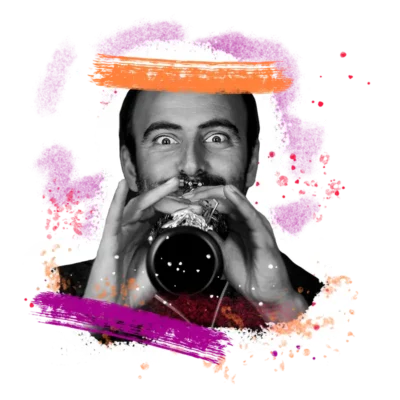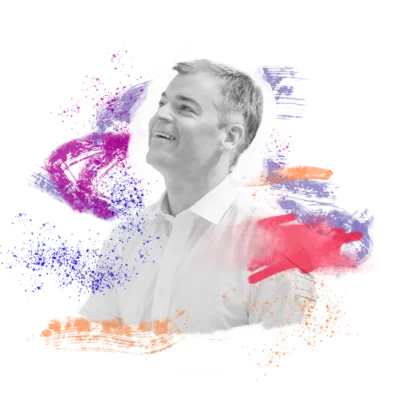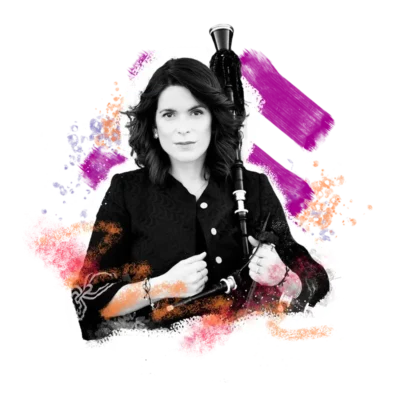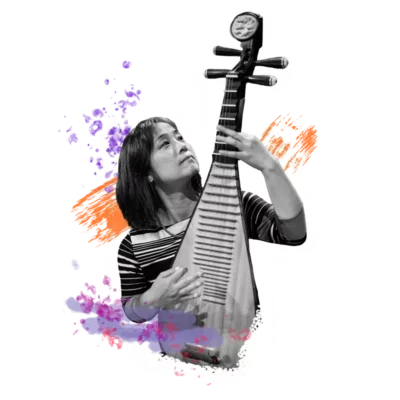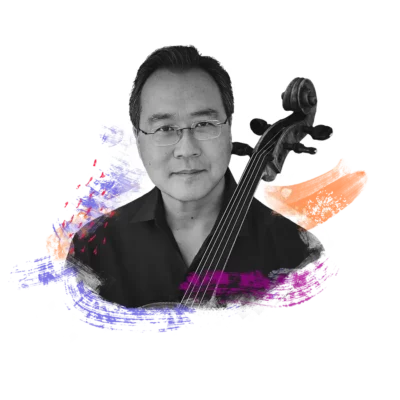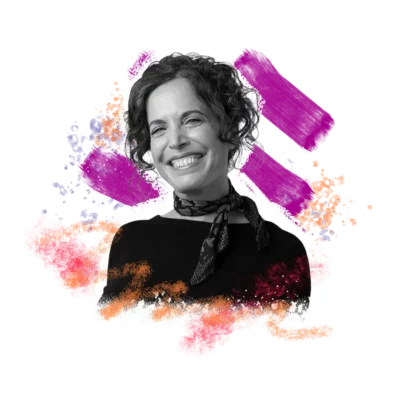How to spark others
The Silk Road Project was an ambitious idea: to not only create a category of music that had never been heard before, but create ensembles to perform it and audiences who were hungry to hear it. How did Yo-Yo Ma build this vision? He knew from the beginning that it wasn’t about him.
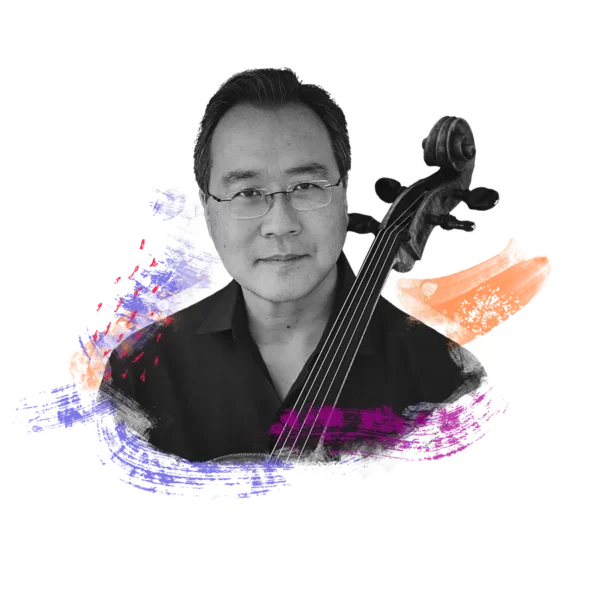
Transcript
Table of Contents:
- Chapter 1: The first spark
- Chapter 2: Start from trust
- Chapter 3: The next spark
- Chapter 4: The role of the scout
- Chapter 5: The Silk Road Ensemble in their own words
- Chapter 6: Meet Wu Man, on the Pipa
- Chapter 7: Meet Joseph Gramley on percussion
- Chapter 8: Tanglewood, the first gathering of the Silk Road Project
- Chapter 9: The first terrifying rehearsal
- Chapter 10: Yo-Yo didn’t play. He listened
- Chapter 11: The music was really hard
- Chapter 12: Exam day
- Chapter 13: Countering criticism and building momentum
- Chapter 14: Meet Kinan Azmeh on the clarinet
- Chapter 15: Meet Cristina Pato on the Galician Bagpipes
- Chapter 16: Handing it over
Transcript:
How to spark others
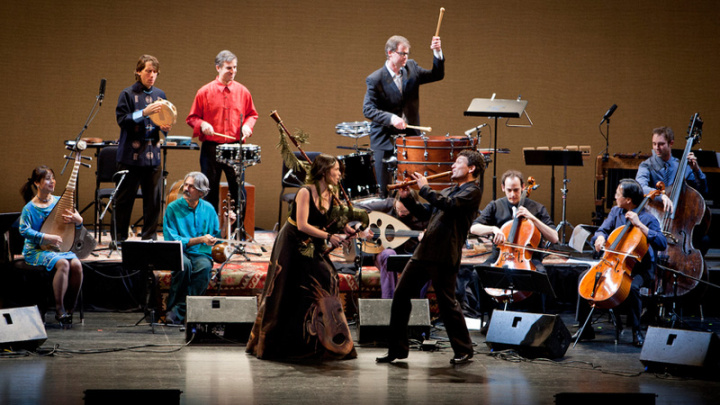
The shared energy of the Silk Road Ensemble is so evident in this picture — see how each musician is looking at or reacting to another, even founder Yo-Yo Ma, who’s the first cellist on the right. The Silk Road Ensemble performs at the Mondavi Center at the University of California, Davis on April 8, 2011. In front, Christina Pato of Spain plays the Galician bagpipes while Kojiro Umezaki of Japan plays the shakuhachi (flute). (Photo by Max Whittaker)
Chapter 1: The first spark
YO-YO MA: The first spark probably happened before I was born. My father grew up outside of Shanghai. Like probably a lot of Chinese families, he was expected to go into some form of economics, business or something, but he wanted to study music. There was a discussion. You know, “You’re going to do what?” And I think the compromise was, “Okay, but you gotta go get a PhD.”
My father left China and he went to France to study everything that the French could teach him about music: harmony, counterpoint, fugue, musical analysis, whatever, and he wrote his PhD thesis in musicology on Chinese music in the European style. If you think about that subject, it’s really about one understanding the other, and saying that in culture, you turn the other into us.
What I’m seeking, always, is about a global cultural literacy where we can start to really converse, knowing where someone is coming from. If I know something that’s really precious to you and you know something that’s really precious to me, they don’t have to be the same thing. We start off having a much better conversation.
JUNE COHEN: That’s Yo-Yo Ma, and he’s about to tell us the story of creating the Silk Road Project, which just marked its 20th anniversary. In 1998, he had the idea to bring together musicians from all the countries along the silk road – the ancient trade route that ran from China to the Mediterranean Sea. These instruments had common roots, but had never played together in a single ensemble – until Yo-Yo made it so.
So this is a specific story about a legendary cellist who creates a daring new ensemble with a global mission. But the story also has powerful universal lessons. It’s a master class for any leader or creative one who hopes to bring a big idea to life.
And as Yo-Yo takes us on the journey of creating the Silk Road Project, you’ll learn the secret to creating something original and ambitious that lasts: You have to spark others.
You see, Yo-Yo knew from the beginning that it wasn’t about him. Even when people wanted to make it about Yo-Yo Ma, the star cellist, he had a talent for making it about everyone else.
So as we move through the story, you’ll hear how Yo-Yo widens his circle of contributors and supporters, by sparking something in each of them. You’ll hear him use empathy and humor to bring people to the table. And you’ll eventually hear him orchestrate his own exit so the project can live past him. It was all about sparking others.
And here’s what you need to know about Yo-Yo Ma and Silk Road:
Starting as a child prodigy, Yo-Yo Ma has built a six-decade career as a classical cellist, playing Bach and Brahms with orchestras around the world. He’s recorded more than 90 albums and won 18 Grammys. But he’s also a musical omnivore, and a committed collaborator.
As you’ll hear, Yo-Yo started the Silk Road Project, with a single workshop at the famous performing arts center called Tanglewood. Twenty years and countless concerts later, the parent organization is now called simply Silkroad, and its new artistic director is Rhiannon Giddens. They’ve had a huge impact not just on music, but how we think about cultural influences and cultural exchange.
One more word on the story you’re about to hear. In keeping with the spirit of Silk Road – and the central creative lesson in the story – we’ll hear not just from Yo-Yo but from four of the musicians he sparked and who helped him spark others. They include clarinetist Kinan Azmeh; percussionist Joseph Gramley; Cristina Pato, who plays the Galician bagpipes; and founding member Wu Man, who plays the traditional Chinese stringed instrument called the pipa.
But the music you’ll hear on this episode is our composer Hil Jaeger, who’s playing along with this story on prepared piano. For visuals while you’re listening, go to sparkandfire.com/silkroad.
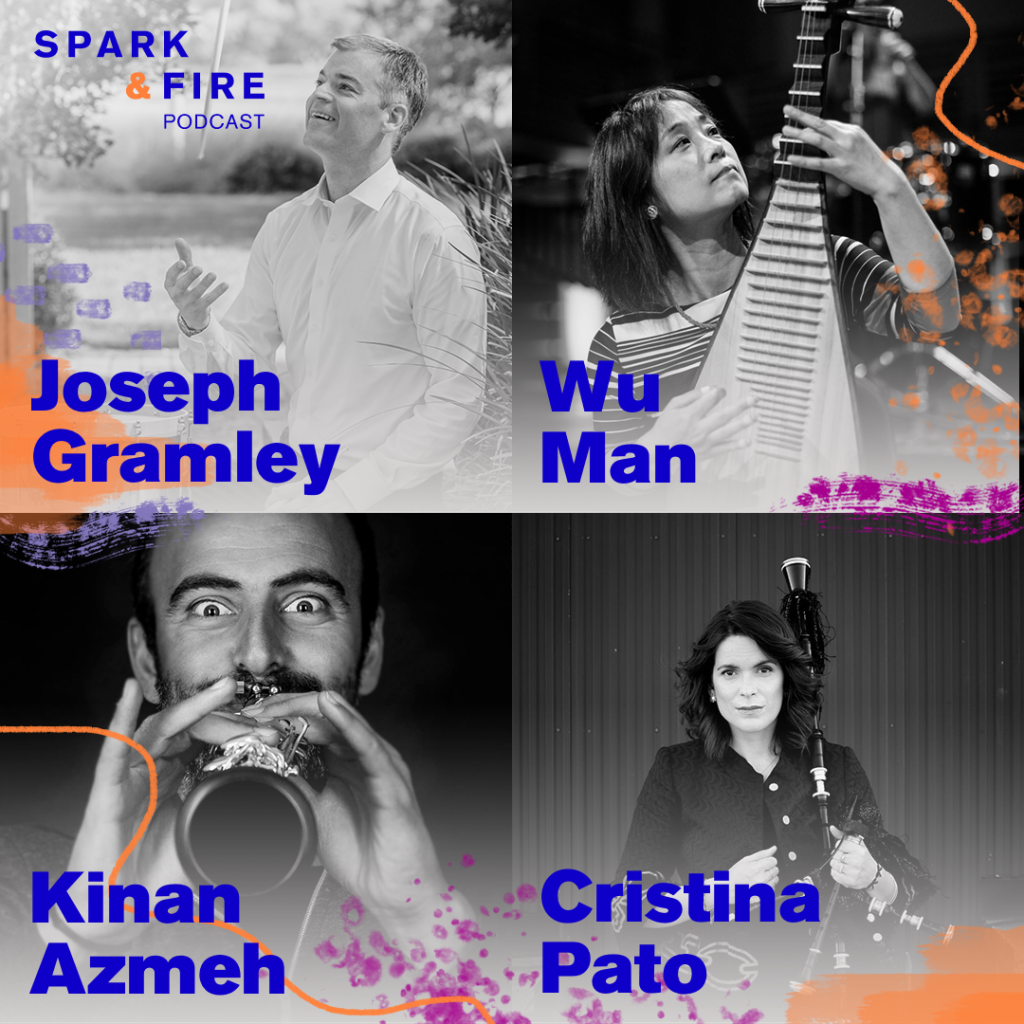
Chapter 2: Start from trust
YO-YO MA: Serendipity plays a big part in my life. I’m very trusting of the unknown. I’m very trusting of other people. I start from trust. I do what I do. Not because I deserve it and because I have such amazing skills. No, I was lucky.
In the late fifties when I was seven years old, we came to the United States. I remember taking the train from New York to Rochester to Chicago all the way to San Francisco, to Berkeley, we had relatives there and we went through Denver and came back to New York about to go back to France forever.
My sister who played violin and piano and many other things, and I gave a concert and a lady showed up who had heard about the Ma children and the Ma father educating his children in music. She was looking for a music teacher for the school that she had founded, and on the spot, after the concert, she proposed that my father become the music teacher at that school. If we hadn’t met that lady, I would be a completely different person.
I came to the States and embraced this new world. Paris, New York, the visuals are different. The tastes are different. The colors are different. Obviously, the language is different. The habits are different. I was wide open.
We used to go to the Luxembourg Gardens in Paris and the grass was all fenced in. You cannot step on the grass because it was kept beautifully manicured. When we arrived in the states, we lived close to Central Park in Manhattan and you could walk all over the grass. Okay, given it’s not very necessarily well kept, but you could run all over the place. Everything tasted and looked different. That made me think that what I wanted to do most in life was to understand.
JUNE COHEN: Did you notice the kind of words Yo-Yo uses throughout this chapter? He’s wide open. He starts from trust. He wants to understand. And this posture of curiosity and openness would become the principles behind the Silk Road project.
But these principles would also form playbook on how to bring this vision to life. Yo-Yo knew from the beginning that it couldn’t just be about him. If Silkroad was going to grow into an ambitious, impactful project that endures – he had to spark others.
Chapter 3: The next spark
How do you build a creative vision? Look for signs that the world is changing – and then look for the scouts who can help you lead the way.
YO-YO MA: In 1996, someone says to me, “You got to think of something to do for the Hong Kong changeover. It’s British colonial rule. It’s 150 years of humiliation, so we’re going to kick the British out and this is the return of Hong Kong, it’s going to be … ” And I thought, “I can’t participate in that because obviously, Britain and China are more than that moment of history.” Because I loved archeology, I knew that there were a set of huge bronze bells that were discovered in 1978. There was something in the technology of the alloy that when you play it, it actually has two tones, which nobody’s been able to replicate since that time.
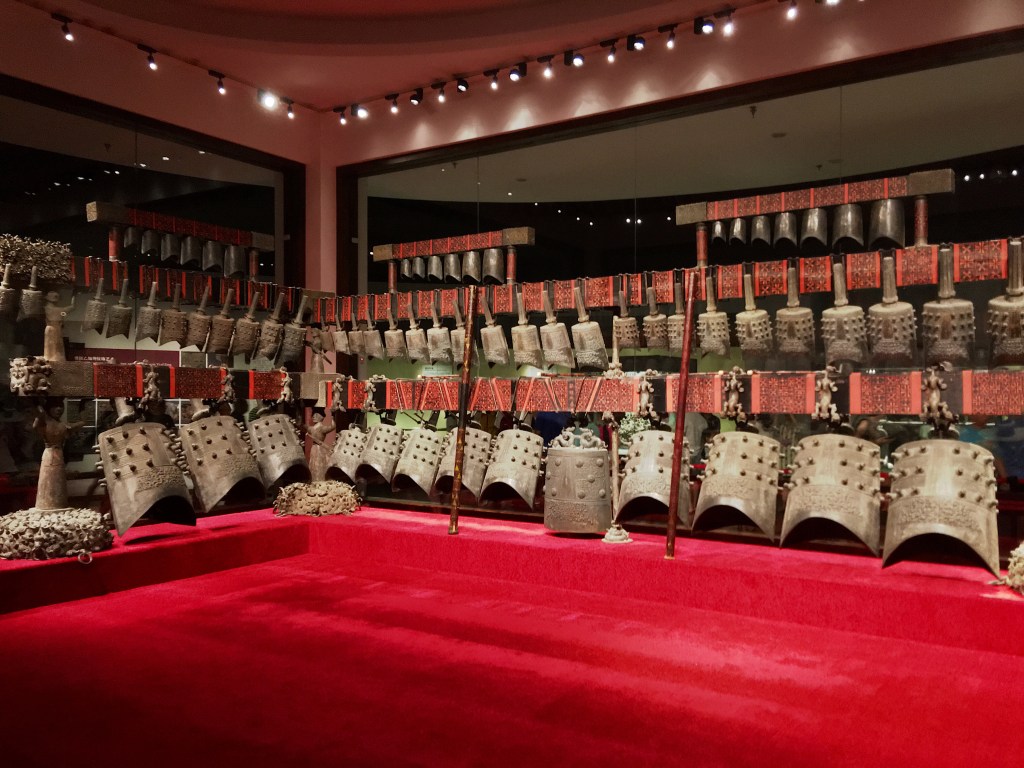
This set of 65 bronze bells was buried with the Marquis Yi, toward the end of the Chinese Bronze Age, and discovered in the ’70s. Their unique two-tone sound inspired Yo-Yo Ma and composer Tan Dun. Image by YouTable – Own work, CC BY-SA 4.0
I thought, you know, they’re 2,500 year old bells. If we could play this piece with the bells, with a children’s course from Hong Kong, then you have 2,500 years of history and you have the future. All of this fueled the Silk Road because it gave experience of saying, okay, well, we know about these traditions and that traditions and what else don’t we know?
In 1998, we formed the Silk Road Project. We raised money so that we could find the scouts that would go to Central Asia, that would go to Mongolia, that would go to China, that actually know the territory, can gain trust of the local people. They went for years, scouted and found composers and then we commissioned them to write pieces, find the musicians, and bring them over.
JUNE COHEN: Did you notice the way YoYo immediately looked outward after he came up with the idea for the Silk Road project? If he was going to bring this idea to life, he knew that his job was to spark others. And not just to spark them himself, but to identify scouts who shared his vision and could go out and spark others.
Chapter 4: The role of the scout
How do you create something culturally unique? Go all the way to the edge of what might be.
YO-YO MA: You go to a public beach, it’s filled with people. You go a hundred yards away, it’s fewer people. You go 500 yards, it’s absolutely almost nobody. Now, any one of those people that are at the entrance of the beach can go to the place that’s 500 yards away, but they don’t. And that’s the tension that we all have as human beings. We want to congregate together. We want to be part of a group, but we also want something special. By making that extra effort and walking those 500 yards, you get to something special, but not everybody wants to do that.
I’m very, very attached to the idea of scouts in our societies that go beyond what is the norm to say, what’s on the edges of what might be this hypothesis. You analyze the risk, you take the risk and you go.
Chapter 5: The Silk Road Ensemble in their own words
YO-YO MA: At the Silk Road Project we’re always saying that we’re actually working for something that’s bigger than ourselves.
JOSEPH GRAMLEY: The sound of Silk Road is something you’ve never heard before because the combination of instruments never existed. Yo-Yo, when we met he described the Silk Road as the internet of antiquity. That’s a really great way for me to think about it, about the sharing of ideas across multiple lands.
How can I connect the cultures of the world? How can I bring people together? How can I approach the other and begin a conversation.
WU MAN: The Silk Road idea is it’s doesn’t matter where you come from. The music roots actually came from the same roots no matter you’re West or you’re East, it’s all from the globe. So we can meet each other to work together and maybe we can create a new kind of language.
CRISTINA PATO: Silk Road has given me the ability to be free with my instrument. Classic music and folkloric music, historically speaking, we kind of put them in different boxes. It’s impossible to disconnect those two worlds.
KINAN AZMEH: It’s a way of thinking. All of us do this naturally in the way we live. We discover different foods, different music. But once you like something, go deeper into what you just discovered. And I think that’s what Silk Road is about, to try to invite people to dig closer to the cultural sources. to look not only within, but also within the other in a deep and meaningful way.
Chapter 6: Meet Wu Man, on the Pipa
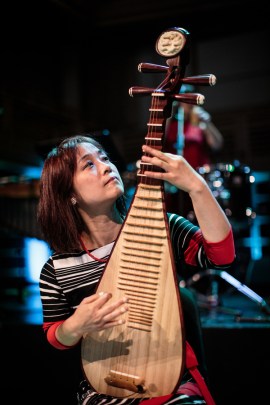
Pipa player Wu Man, with the Silk Road Ensemble, performs at Weill Hall at Sonoma State University in Rohnert Park, California, August 19, 2016.
WU MAN: I always describe a pipa as pear shaped with the four strings looked like instrument and string plucking instrument, like a banjo, mandolin, but pipa sound very distinctive sound. People came to me, always tell me, “Oh, the pipa, first time I heard about sounded like a mandolin,” and someone, “No, no, no, sound like a harp,” or, “Sound like a guitar,” or, “Sound like a ukulele.”
It was introduced to China through the Silk Road trade. Persian instrument took 2000 years to travel from Central Asia to China, become rooted in that land and developed and become something else, become pipa.
Yo-Yo, for most Chinese, especially musician, big name. I saw him, when I was in China, on the TV, and we’re so proud of. So for young musician, we are in China, grew up in China’s, here’s Yo-Yo Ma, he plays the cello. How come they play all Western classical music? It’s so fascinating.
I came to United States 1990, getting very much into the new music scene, worked with many composers, Philip Glass, Kronos Quartet, Lou Harrison wrote a music concerto for me and I play lot of contemporary music, which is mixed with the East and West.
The first time I met Yo-Yo. We played a lecture concert together. That was about what is traditional, what is contemporary? What is East, what is West?
So during that very interesting lecture concert, Yo-Yo told me he wanted to founded this group called Silk Road. He said, “Well, I just want to have a band. The band is like mixed instrument, mixed musician, all from a different country that kind of international band so we can tour.” And then I look at him. I said, “Wow, that’s kind of my dream. That’s my mission. I want to do that too.” So of course I said, “Wow, let’s do it.”
JUNE COHEN: When you heard Wu Man describe that first conversation with Yo-Yo about the Silk Road project, could you almost feel the sparks? Yo-Yo knew that he needed scouts like Wu Man to bring the project to life. So he deliberately turned his mission into their joint mission… And you’ll soon hear how Wu Man goes on to spark others…
Chapter 7: Meet Joseph Gramley on percussion
JOSEPH GRAMLEY: I play basically anything you can shake, scrape or strike. I was trained to play in an orchestra. I went to Julliard and I should have ended up in an orchestra and for a while, that was my dream, but as I started to play more instruments from around the world, I started to branch out and play a lot of new music, a lot of global music, a lot of world music.
We were doing an opera at the Charleston Spoleto festival. We were rehearsing in an old house on the second floor that they turned into a rehearsal loft. We went to lunch one day. It was myself, the famous pipa virtuosa Wu Man, and the composer Bright Sheng. There’s an amazing restaurant on the corner called Justine’s Kitchen, best fried chicken and mashed potatoes you’re ever going to find.
We were at a table near the back, each at a corner facing each other and that was when Wu Man mentioned this project I had never heard of. “Hey, Joe, we’re doing this project up at Tanglewood with Yo-Yo Ma and we are interested in finding percussionists who play both Western and non Western instruments.” Turns out Bright had been hired as a consultant to find composers from the lands of the Silk Road. “Now, listen, Joe, there’s no pay and you’re going to have to stay with a host family, maybe sleep in the guest room, maybe sleep on the floor. Would you be interested in joining us?”
I didn’t own a car. So I rented a minivan. I found myself two months later driving every instrument I owned – Chinese opera gongs, tam tams, which is just a massive gong. I had a new gold bar vibraphone, I had a bunch of drums from China, I had some large Japanese drums, which are called odaiko, the marimba bars, they’re made of rosewood from Honduras. They were very delicate. I’ve usually rolled them up in a blanket and I put them on the front seat so I could take care of those two little bundles of joy up to Tanglewood. It’s a beautiful drive. Big blue sky, bulbous, round, full green trees up the highway. I could hear the rattle of the gongs and the tam tams in the back of the car. I was nervous. I was excited. I didn’t know what I had gotten myself into.
JUNE COHEN: Did you notice how Joseph was sparked by Wu Man, after she was sparked by Yo-Yo? It’s a theme you’ll hear again and again in this story, as the Silk Road project takes hold. And something to remember in your own creative work: Who are the scouts who share your mission? Who are the scouts who can spark others?
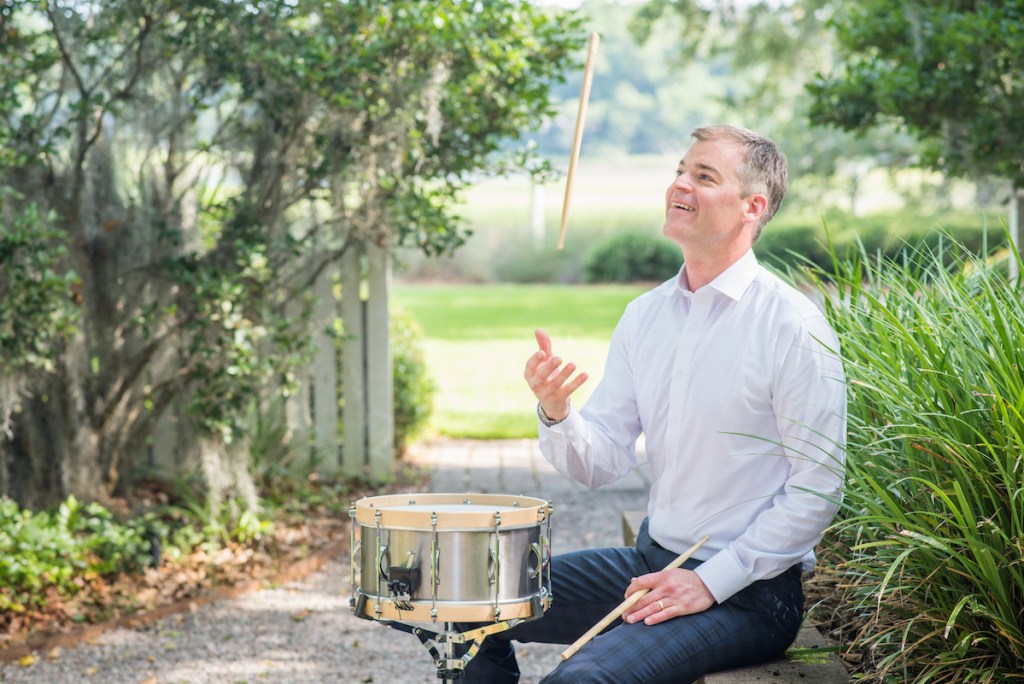
Percussionist Joseph Gramley drove up to Tanglewood in a van full of every instrument he could lay his hands on – not sure exactly what lay ahead.
Chapter 8: Tanglewood, the first gathering of the Silk Road Project
JOSEPH GRAMLEY: Tanglewood is an arts center in Western Massachusetts, They have now three or four concert halls. There’s a lake nearby. There are rolling hills. It’s absolutely beautiful.
WU MAN: Tanglewood. It’s like, oh, my gosh. As a young musician just landed in this country and playing this weird Pipa instrument and then wanting to go to a Tanglewood. Everyone said, “Wow, summer, go to Tanglewood to listen to music or the Boston Symphony going to be play there.” It’s like a dream place, heaven.
YO-YO MA: The Western musicians all volunteered. They were interested because they’re curious.
JOSEPH GRAMLEY: I arrived to Tanglewood and I unloaded. And then I went to meet the bus. The bus hadn’t yet arrived from JFK.
YO-YO MA: Drivers volunteers would get lost and finally get to the house at midnight.
JOSEPH GRAMLEY: And then I see, from about a hundred meters away, the bus turns into the parking lot, comes straight towards us, then parks right in front of all the people. It turns out these folks were our host families.
YO-YO MA: We had no money, so people opened up their houses. This was like a family affair.
JOSEPH GRAMLEY: And then, people started to introduce themselves to each other. At this point, there was a massive language barrier.
WU MAN: I met so many musicians, composers from Mongolia, from Azerbaijan, China, Japan, Turkey, and I can’t remember, so many – Iran – and so many musicians and composers there.
JOSEPH GRAMLEY: We went from there to a group picnic at one of the host families’ homes. There began just the process of getting to know each other.
YO-YO MA: You know, my poor family. I have to apologize and thank them. Jill went out the day before and bought pounds of rice and rice cookers. The Mongolians, turns out, eat quantities of meat that you would not believe. Steaks, three pounders, gone. Sixteen eggs. Halal. There were non-meat eaters. People only eat rice. They’re in strange territory, so we have to win their trust. We have to give them the things that they operate from. And did we know? No. Did we find out quickly? Yes. Was it scary? Yes.
WU MAN: I can feel that happiness there, we know something’s going to happen. We’re going to try something very different.
JUNE COHEN: You might wonder why Yo-Yo spent so much time describing the food. The menu might seem like an unimportant detail. But Yo-Yo knew that if he was going to widen this circle of musicians, he had to win their trust. And trust begins with honoring what mattered to each of them. As he said earlier: “I honor what’s precious to you, and you honor what’s precious to me.”
After the break: Yo-Yo’s greatest fear, that it would all be a disaster.
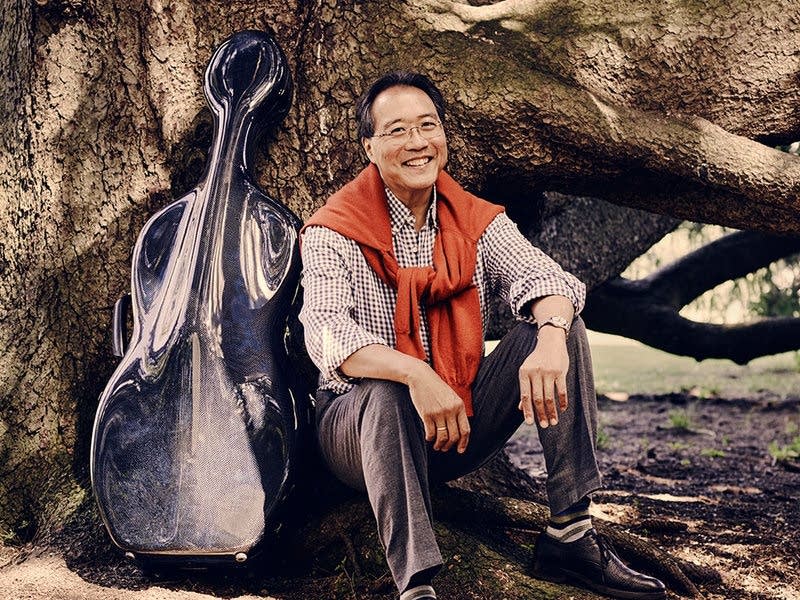
The forested grounds of Tanglewood became a comfortable home for Yo-Yo Ma to build his new vision of Silk Road. Photo: Jason Bell/Sony Classical
Chapter 9: The first terrifying rehearsal
How do you overcome group fears? Find a common language and listen for that transcendent moment.
YO-YO MA: At Tanglewood, the great challenge was fear. The fear that it would be a disaster and that things would fall apart, it wouldn’t work, people hated the music and it’s a bust. That would be a legitimate fear.
We had a lot of pieces to rehearse in 10 days. Tanglewood, they were very generous with giving us rehearsal space and barns.
WU MAN: Like, wow, how can we rehearse there? You’re just in this box. There’s no floor, it’s just dirt, it’s just the grass. It’s very much like summer camp.
First rehearsal was tough because there are a lot of different language going on. We have so many translator as well. It’s like in, I don’t know, UN.
JOSEPH GRAMLEY: The language barrier was something that we addressed on a case by case basis, depending on who was in the group and which common languages they might have. For example, I played in a group with Kayhan Kalhor, who’s Iranian. He had studied in Canada and spoke, his English was good at the time, but he also spoke Italian and I spoke Italian, so we would use that commonality to then translate for other people. One of the violinists spoke Russian and English and that was incredibly helpful for the artists from Central Asia, because they had spoken Russian there. It was our way in.
WU MAN: After the worst rehearsal, mosquito – I remember so clearly the first Tanglewood workshop, the mosquito just bite at me the whole body, but that was so memorable and that’s the happiest time for me. After a few days, we don’t need a translator anymore. The room started empty and it started only musician there. I was very moved by that.
JOSEPH GRAMLEY: I was in a rehearsal on the East barn and all of a sudden, I heard this voice and a style of singing I’d never heard before. So we literally all stopped. It was the voice of Congrazole Gongbatar, a Mongolian long song singer who had such power that her voice went from the West barn all the way up to the East barn and forced us to stop our rehearsal. And we just listened.
WU MAN: Somehow we just communicate without language. We understand each other. That’s the beautiful thing.
Chapter 10: Yo-Yo didn’t play. He listened
How do you lead a new group into existence? Take the attention off yourself and place it back on them.
YO-YO MA: We started with written pieces, groups of five or six people playing something that had been organized.
JOSEPH GRAMLEY: What Yo-Yo did is he commissioned 25 new works for us to read through and learn and workshop. Of course, the pieces almost always had cello in hopes that Yo-Yo would play. Yo-Yo didn’t play. They brought in six cellists and he walked around and he listened and he talked to people and he got to know people.
WU MAN: He was very busy, very busy. Travel to each barn to listen to our rehearsal, to question himself, is this good? Is this makes sense? Try to find out, is that going to work? Also a lot of instruments that he probably never seen before.
YO-YO MA: Then it became the group. What is the purpose of the group? You could see the friendships form and that there’s so much to explore, there’s so much to dig out, there’s so much, it’s endless.
Chapter 11: The music was really hard
How do you inspire a group to go beyond what they thought was possible? Honor every contributor. And laughter always helps.
JOSEPH GRAMLEY: A lot of times, if you’re not ready by the first rehearsal, it’s too late just because there’s such limited time to learn this music. I’d had the music now for about three weeks. I was playing six new commissions. The majority of the pieces had multiple percussion instruments.
I would practice late into the night. I’d get up in the morning before rehearsal to practice my parts. I’d studied the score, I knew the different instrumentations in each piece, so I knew what I was getting into musically, but I didn’t know any of the players. I was a little anxious about if I was going to be good enough, if I was going to be able to keep up with artists that Yo-Yo Ma had selected.
WU MAN: You have to learn the piece quickly and some pieces very contemporary, it just a very microtonal, very new, it’s so hard.
JOSEPH GRAMLEY: The music was really hard. These composers who Yo-Yo commissioned really threw a lot at us. So the notes were hard, the notes were fast. I’d never played in ensembles with these instruments. I had never heard of some of these instruments.
WU MAN: And also play with so many different people from different country and different instrument, which a lot of instruments you never see before, that’s quite challenging.
JOSEPH GRAMLEY: One of the really interesting journeys that Silk Road and Silk Road Ensemble has been on has been, firstly, finding our sound, who are we? We had sharing sessions where new instruments that we had never heard before would talk about their instrument and their culture and their home country
YO-YO MA: We wanted to honor traditions. Persian tradition is very specific. Mongolian long song tradition is very specific. It’s amazing. Also very loud.
WU MAN: The pipa sounded very different with this huge percussion and how we balanced.
JOSEPH GRAMLEY: Now I need to balance my sound with that instrument. I need to morph and merge my groove and my time with artists who have a different sense of groove from their culture. We had to find the musical connection to successfully bring to life the visions of the composers. That was the hardest thing. There were moments when one might think, this is not going to work. You might be panicked. You might be in the middle of a piece of music and you have to stop because people are in different places and you’re never going to get back on. A lot of my training in chamber music, in Western classical music, it comes from the musical score and you study the score and then if there’s an issue, you can jump to where that is. Not possible with the music of Silk Road because it’s so new.
The first open rehearsal was in the brand new Seiji Ozawa Hall at Tanglewood. That was a dry run. Mostly, it was the host families, maybe 75 to 100 people, all seated up pretty close. It was a very relaxed atmosphere. There was a lot of laughing, but there were more than a few times where folks had to stop or someone would look across the ensemble and someone was in a completely different spot and they’d have this moment of, uh, what do we do? Who do I go with? And we smiled and we laughed and Yo-Yo would say something funny and bring us all back together.
YO-YO MA: Not having control of your environment and somehow staying focused and resilient. If you control something too much, you’re delivering a product and that’s not what live performance is about.
Chapter 12: Exam day
JOSEPH GRAMLEY: We had grown close over two weeks. We had struggled with the music. We had worked really hard.
WU MAN: You have to learn many pieces in 10 days. And then the last day, you have to present to those piece in the concert with a public audience and they’re all musician. That’s kind of a nervous, like college exam day.
YO-YO MA: At the end, we were having all these managers and presenters come in from around the world to create a moment where we can actually show what these things were.
JOSEPH GRAMLEY: Managers were there, agents were there, conductors were there to hear this music for the first time. What was at stake was a belief that this music needed to be heard and that if we didn’t play it well, we might lose the opportunity to play it again. If we played the music well, would people accept it? Would they want to hear more of it? To see if it could tour.
YO-YO MA: They’ll have to figure out how to market this idea for their local audiences /// to see whether we were trustworthy enough to make the leap.
WU MAN: During intermission, this older guy from audience came to me, he said, “I really enjoyed your play. I think you’re a very sensitive musician.” I shaked hands, thanked him, and then I almost turned away and he said, “By the way, I’m John Williams.” The huge movie, “Star Wars” composer. Not every piece is a success. Probably half the pieces wasn’t success.
JOSEPH GRAMLEY: I left Tanglewood not knowing if I would ever see these new friends again.
Chapter 13: Countering criticism and building momentum
How do you create an audience for something entirely new? Offer it along with something they already love.
YO-YO MA: There were a lot of issues to confront, oh, he’s bored, so he’s trying to do something else. It’s not serious, it’s a narcissistic project, being accused of cultural tourism. And I was worried about that because I don’t know anything, but we’re trying to actually get creative people and scholarship together. If you do that, there’s a greater chance that you connect to gain acceptance.
JOSEPH GRAMLEY: I went back to New York. I went back to my New York City freelance life and luckily, maybe a month or so later, I got a call that I was asked to join the first tour.
WU MAN: We chose a lot of pieces from that workshop and put it together as a program and started the first Silk Road Ensemble tour. The first tour of Silk Road actually still more like a try out and to see what the audience reaction of this kind of a combination of the group. People say, “Oh, this is a Yo-Yo Ma concert?” No, this is not a Yo-Yo Ma concert.
JOSEPH GRAMLEY: The presenters who booked us didn’t want a full concert of Silk Road because they didn’t know what it was, so the first half was Silk Road. We played the piece from Mongolia. We played a piece by [inaudible] Ping from China, but the second half was the Ravel piano trio with Yo-Yo Ma, Colin Jacobson, and Joel Fan. That was so that the audience could have an anchor point to this type of new global classical music. In subsequent years, we then morphed away from playing classical repertoire to full concerts of Silk Road. So there was a learning curve not only for us the artists, but for the presenters and the audiences.
YO-YO MA: We wanted to go from the heart of what they knew so that we could make the connection to what people might be used to hearing and then trust us enough to make the leap. What’s precious to you is precious to us.
JUNE COHEN: Did you notice how Yo-Yo approached the new audience the same way he approached new musicians? First he built trust. By combining the new music he’s championing with the classical music they love – he’s demonstrating once again: what’s precious to you, is precious to me.
And as we continue – you’ll see how Yo-Yo and the Silk Road project kept sparking other musicians, all over the world, in the years that follow.
Chapter 14: Meet Kinan Azmeh on the clarinet
KINAN AZMEH: I was in Damascus. My dad tells me that he heard about the launching of a new project called the Silk Road Ensemble. It’s about the bringing together seemingly different traditions and he tells me, “Keep an eye on this.”
It’s 12 years after the Ensemble was found. I move to New York and I get to meet through the wonderful scene in the crazy city of New York City, many musicians, some of them played in the Ensemble. The ensemble doesn’t do auditions. There’s not an announcement where, okay, “We need the clarinetist to join or a tuba player.” And then one day, I was in my apartment in Harlem and I received an email. “Hello, dear Kinan, would you like to come and play with us with the Silk Road? There’s a residency at Harvard University.”
I immediately thought of when my dad was telling me about the project 12 years before that. It didn’t even read the rest of the email. I was just replied, “Yes, yes, yes, yes, yes,” and sent it.
I thought, you know what? If it was a one time thing, you need to enjoy to the maximum and if it was a long lasting relationship, that would be much, much better, but in both cases, I had one chance to do what I do best.
We started the rehearsals. Yo-Yo actually was not there for the first couple of days and we’re rehearsing and I’m like, yeah, I feel good, I feel confident. But then, how disarming it was when Yo-Yo joined a rehearsal a couple of days later and suddenly I was the only person sweating in the room. And Yo-Yo, he’s a joker. He likes to joke around all the time. And I’m the only guy who’s seriously looking at the score because I don’t want to ruin it for myself and for anybody else. But then at the end of the rehearsal, I realized, okay, this is just another band. It wasn’t Yo-Yo and band. It was a band in which Yo-Yo plays on one of the instruments.
You know when sometimes you have a good feeling about something you just finished? Things went great. I enjoyed my time. Every time people talk about art, for me, pleasure has to be at the heart of it as a very noble sentiment to have. And I had the same thought of what I had before. Okay, if this continues great, if not, that was wonderful.
There was not too much time for me to worry, did I do well or did I do not? Towards the end of the residency, they were talking, “Okay, when are we going to be touring the piece?” The moment they ask you to open your calendar, that’s usually positive. There’s something in the future.
JUNE COHEN: Did you notice how Kinan describes Yo-Yo as a joker and also how he describes Silk Road as a band where Yo-Yo plays an instrument. You can hear throughout the story how deliberate Yo-Yo was in making sure that was the case. He knew that if Silk Road was going to endure, it couldn’t be about him. He had to keep sparking others.
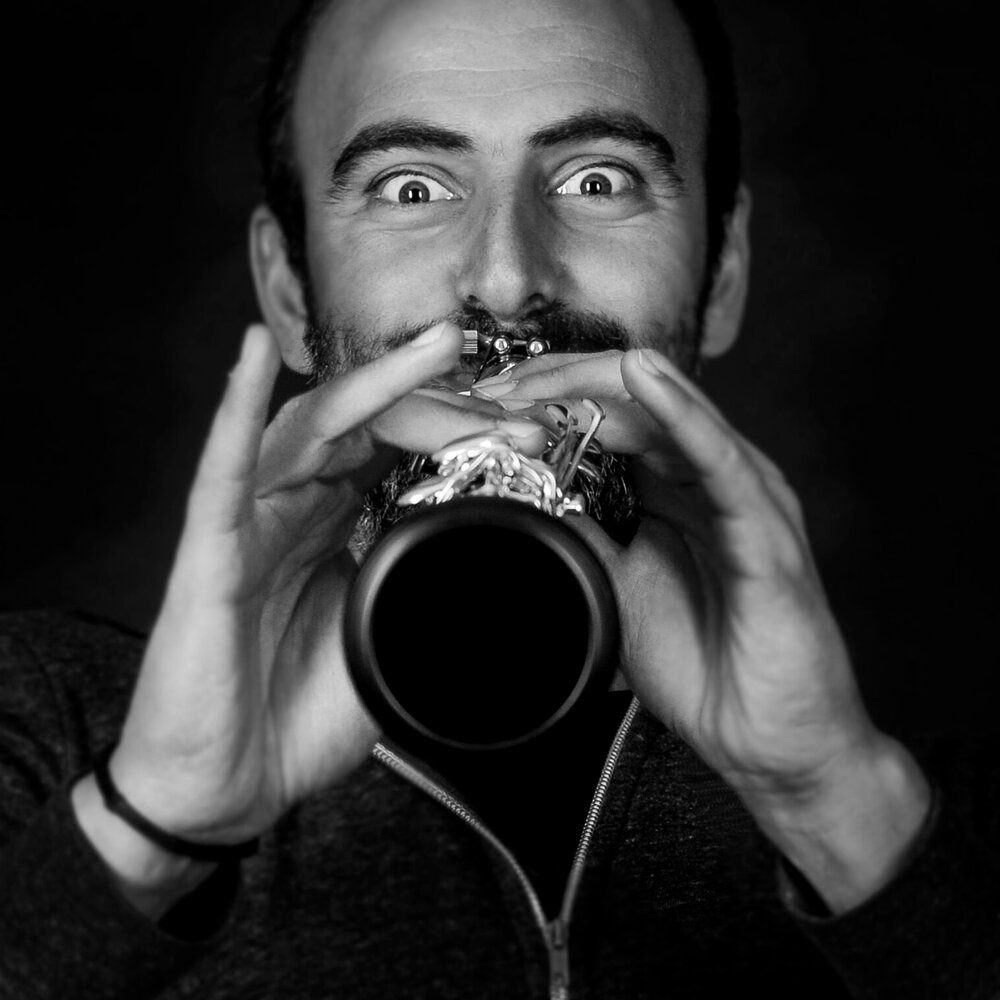
Clarinet player Kinan Azmeh says: “When you play with friends and colleagues, there’s a moment of intense beauty. Music does disappear in the ether somewhere, but what you felt doing it and how you connect to the people who are on stage with you — this is what lasts.”
Chapter 15: Meet Cristina Pato on the Galician Bagpipes
CRISTINA PATO: A bagpipe is a bag and a set of pipes, and that’s the most beautiful description of the instrument.
If the image that you have on your mind is the Scottish one, imagine the Scottish as a military instrument that represents a very particular position of your body in which the drones are looking up in vertical and your whole body is aligned to that particular sensation. The Galician bagpipe is very ergonomic, very comfortable, an instrument that is made for people to gather around for dancing.
I was in Barcelona. I was probably maybe 19 years old. I was taking an ethnomusicology class about trans-cultural initiatives and she mentioned Yo-Yo Ma and the Silk Road Project. And that was probably the very first time I heard about them.
Imagine the late ’90s. The Galician bagpipe was always the national instrument of Galicia but at that moment, it became incredibly popular. I’m part of that generation in which you either play soccer or you play bagpipes, and which I’m not that good in sports.
Bagpipers became kind of like rock stars. We were touring, doing football stadiums and things like that. It was insane. That Cristina, the rock kind of star or whatever you want to name that, took over my life. I wanted to be something else.
I came to the U.S. to do my doctor of musical arts degree at Rutgers University, New Jersey. A composer, Osvaldo Golijov, was coming to give a masterclass and we play for him. When I get the score, I see Luna Descolorida, which in Galician means colorless moon, I was like, “Are you kidding me?” Now, my tiny, amazing language comes to New Brunswick, New Jersey to tell me that no matter where you go, you carry your roots with you, and you have to be responsible with what those roots mean to you.
Fast forward like six months and one day, Osvaldo calls. He was like, “Hey, Cristina. I’m hear in Lenox, Massachusetts with some friends. I wonder if you and your husband would like to come.” He asked me to meet him at one of the gates at Tanglewood because they were having a worship there.
He mentioned Silk Road, then I was like, “Oh yeah, I think I’ve heard of them.” Yo-Yo Ma was there and some musicians from around the world were there. After we spend the day worshiping this music together, Osvaldo tells me, “Okay, play something and explain us the history of your instrument.”
I started doing that, and then I see them with the typical face we all have when we are seeing something for the first time in our lives, this mixture of oh my goodness, that’s a wall of sound. Either you love it or hate it – that’s the beauty of the bagpipes. It was just beautiful, and I usually play with that feeling a lot, the surprise of not knowing exactly what is this woman going to do with that instrument.
After that moment, Osvaldo said, “I have to include you in the piece that I’m writing for Silk Road.” They were performing at Carnegie Hall the Friday after. I was there with them, performing.
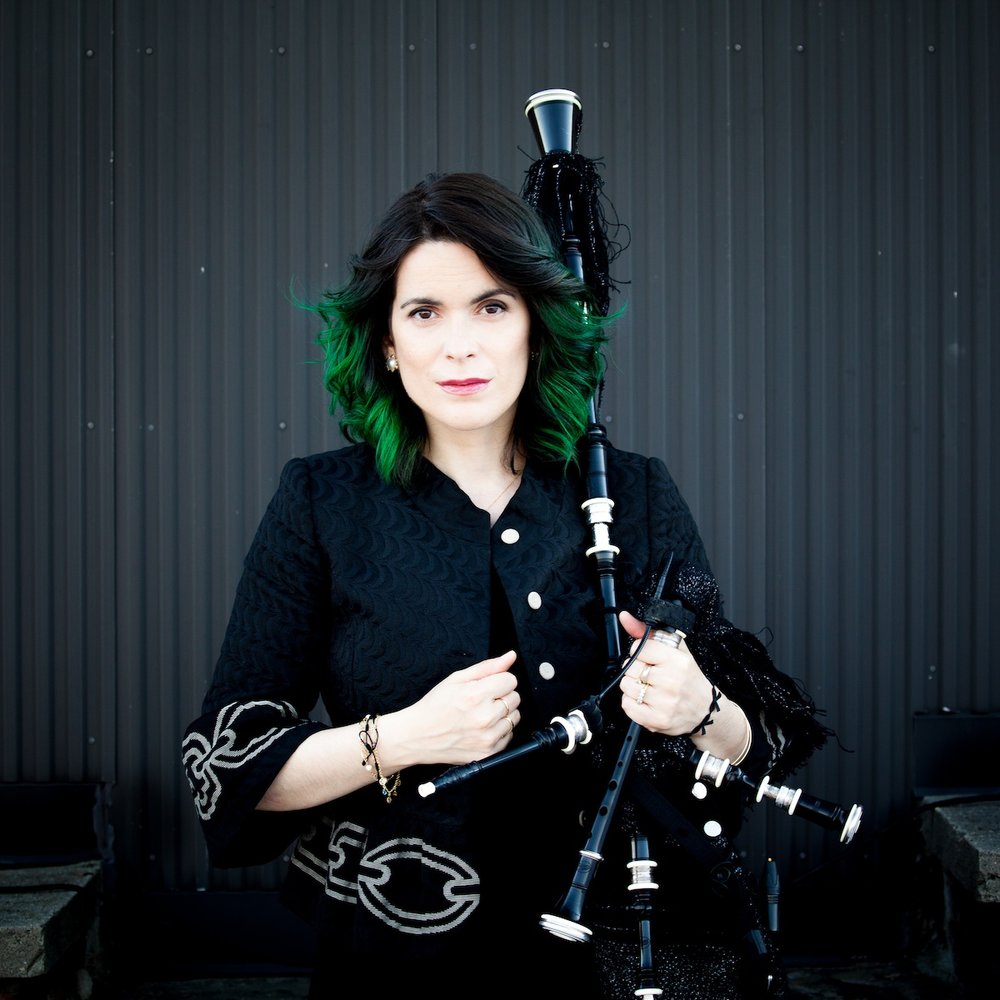
Cristina Pato, Galician bagpiper: “Silk Road has given me the ability to be free with my instrument.” Photo by Xan Padron
Chapter 16: Handing it over
YO-YO MA: I knew that at a certain point, it was already late not to get into founder’s dilemma. It was always identified as Yo-Yo Ma’s Silk Road Project. Well, that’s not good. How can it be independent? So finally, I was able to resign. To their great credit, this is an independent organization. Every year, I say, “Look, I can give you 10 days time, you can use me whatever way you want. I have nothing to say. You just tell me, do this, this, this, I’ll do whatever you want. This is my contribution, but I’m not going to ever initiate a conversation: ‘You know this? I think you should do this.’ I’m never going to do that.”
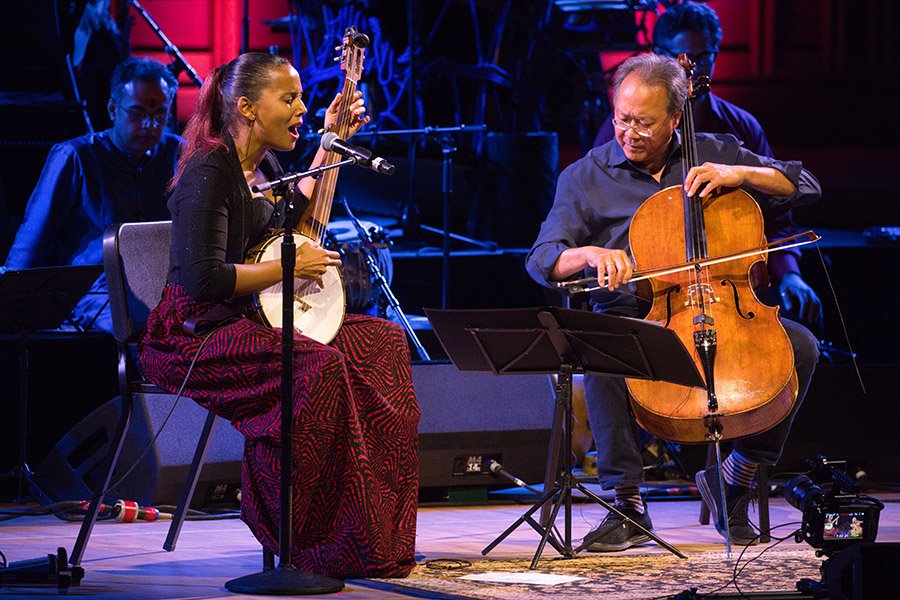
In 2020, the amazing Rhiannon Giddens officially became the new artistic director of Silkroad. Here, she plays onstage with founder Yo-Yo Ma. Photo: Hilary Scott
JOSEPH GRAMLEY: It started from an idea that Yo-Yo Ma had this project began from his brain and through his empathy and communication and cultivated relationships, he got the support that he needed to then bring us in.
CRISTINA PATO: In a Spanish, we say, “Ponerse en el lugar del otro,” which literally means, to put yourself in the place of the other. He has this ability of putting himself on the other side all the time.
When you enter a room of people that you don’t know at all and you’re always looking for that kind of face that will welcome you, that face is always Yo-Yo. Somehow, he ends up being the most generous, welcoming, human being in the room.
JOSEPH GRAMLEY: And Yo-Yo’s a hugger.
WU MAN: Yo-Yo nurtured us.
CRISTINA PATO: He’s full of energy, endless energy, and incredibly generous and you can see that from the very first moment you meet him as a person. And I met him as a person first, and then as a musician and I fell in love mostly with the person. I mean, of course, we all love Yo-Yo the cello player, but it was Yo-Yo the humanist that really changed my life in ways that I cannot even begin to describe.
KINAN AZMEH: What drew me in is different from what I ended up finding. What drew me in is having Yo-Yo in it. It’s such a privilege and an honor and a luxury to be making music with somebody like that.
Of course, being on stage is wonderful, but that’s only maybe one tenth of the time. The other nine tenths are actually us interacting. When you play with friends and colleagues, you take your final bow and then you go backstage, there’s a moment of intense beauty. Music does disappear in the ether somewhere, but what you felt doing it and how you connect to the people who are on stage with you, this is what lasts.
YO-YO MA: What I’m seeking, always, is about a global cultural literacy where we can start to really converse, knowing where someone is coming from. If I know something that’s really precious to you and you know something that’s really precious to me, they don’t have to be the same thing. We start off having a much better conversation.
JUNE COHEN: I want to thank Yo-Yo Ma – and Wu Man, Joseph Gramley, Cristina Pato, and Kinan Azmeh – for sharing the story of this creative journey with us. And I want to thank you for listening. I hope you found things in the story that you can bring into your own work.
Whether it’s the gentle and open manner in which Yo-Yo approaches the world, or the way he recruits extraordinary scouts to help him spark others.
Maybe it’s the way he uses laughter and food to build trust. Or the way each member of the ensemble shares and builds the mission.
Or maybe it’s just the way he brings that simple principle to bear at each stage of this story: I honor something that’s precious to you, and you honor something that’s precious to me. It’s the way to start a conversation, a collaboration, and a big creative vision.
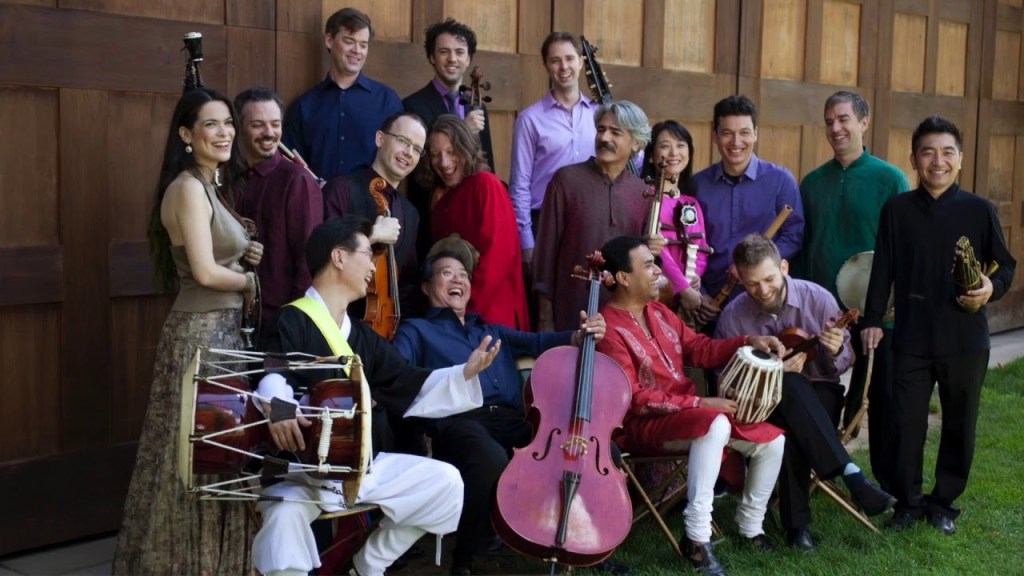
The Silk Road Ensemble, with Yo-Yo Ma in the center, laughing, as usual. This image comes from the doc “Tanglewood Revisited”
About the Creators and Host
